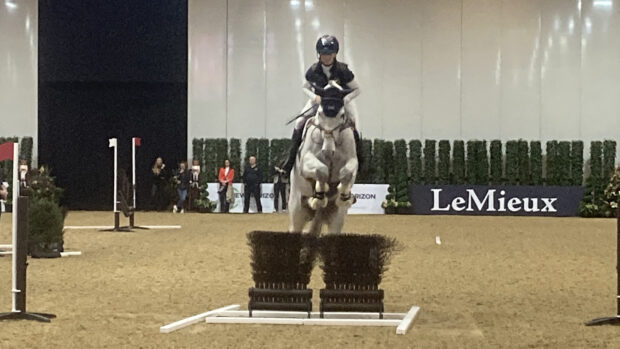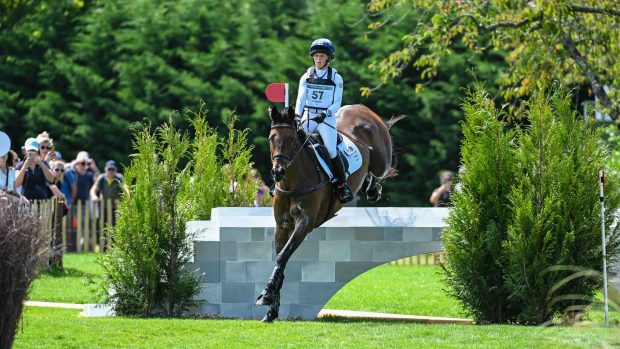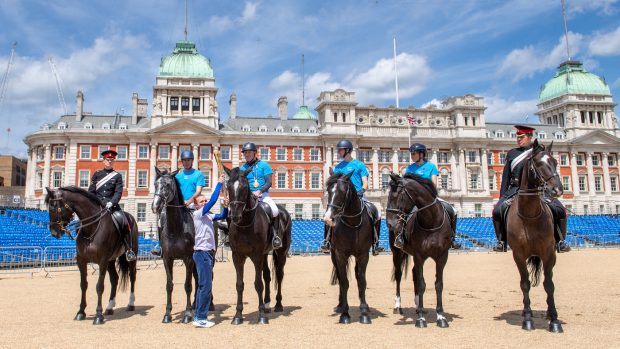How do the best equestrian team managers go about their jobs?
Ride iQ, the audio-focused training platform for equestrians, recently hosted a discussion chaired by Canadian Olympian Kyle Carter and featuring British eventing performance manager Dickie Waygood and Graeme Thom, former performance manager to the Canadian and New Zealand eventing teams.
Here are 12 things we learnt from equestrian team managers Dickie and Graeme – and even if you’re not aiming for the Olympics, there are definitely some useful takeaways here for all of us in our riding, as well as our careers and day-to-day lives…
1. Communication is key.
Dickie says: “In these roles, you’re very much leading from the back, working with a lot of successful individuals who’ve got there in their own right. What you’re trying to do, with that group of highly motivated people, is to lead them in a way that empowers them and keeps their confidence. When something goes wrong, that’s the time to lead from the front not the back.”
Dickie adds that it’s important all the team staff are part of creating an atmosphere that the riders – or athletes, as they are increasingly called, and with good reason – feel confident in and that the grooms are fundamental to this.
“Leaders are people who can influence people and it’s important everyone’s nose is pointing in the same direction,” he says. “As team manager, you’re the glue that holds it together in a lot of ways and you’re trying to keep that ‘one team’ mentality.
“It’s understanding the athletes work really independently for 358 days a year and for seven days a year, we pull them together for a championship. By putting people in that environment, you can create a pressure cooker that could explode at any time. It’s not a sport where everyone is going on the field of play together and working as a team, it’s a completely different dynamic, so it does take a certain skill to manage that. We’re only human and we don’t always get it right, but we strive to do so.”
2. Recognise the importance of home teams
The athletes have very good home teams, from coaches to grooms to physios, says Dickie, and they need to be recognised.
Graeme adds: “We’re surrounded by great people, starting with the athletes and the horses, so it’s about getting out the way and letting them do what they are good at. The grooms are the backbone to all this and all the other staff employed by the athletes to make it happen. We can’t step in to start steering the ship when it’s not necessary.”
3. Plan ahead and agree expectations
“During your journey and pathway to [Olympic] Games, you get to know the individuals really well, so any turbulence and issues are managed way before you go into that team environment,” says Dickie.
“If you can communicate and everybody knows, ‘This is what you can expect from us, this is what we expect from you’, you’ve dealt with everything and set simplistic guidelines before you get to the championship so everybody knows how they should act.”
Dickie adds that in most cases, you have riders who are only an outside chance for an individual medal, but have a strong chance of a team medal if they work together.
“The athletes really get it,” he says. “And it’s the same with owners, grooms, staff – you manage all those expectations before you get to a championship and all that is done before you hit the tarmac.”
Graeme mentioned that in the nations he has worked with, there are fewer combinations in the running than in the British camp, so different styles of communication such as round table dinners have been appropriate.
“We’d get together with the top squad, have a dinner, discuss things, get all their feedback and act on it,” he says.
“There’s an amount of information you want to push forward early from the point of view of logistics, behavioural, performance expectations – let’s not all think we’re going to do a personal best across the board. You might be going into a situation where you don’t have an individual medallist, but if everybody can finish on a sub 33 you’re going to win a medal. Those sorts of things are discussed well in advance and the behavioural side as well and then everybody is happy.”
4. Don’t live the dream until you want to retire
“After [team gold at] Tokyo and and last year’s Europeans, the British have got a target on our backs,” says Dickie. “This is where the hard work really starts and anybody who says they’re living the dream or they’ve made it is stagnating and not progressing. The tempo ups again so you’re on a constant hamster wheel. Don’t live the dream until you want to retire.”
5. Business and sport go hand in hand
We all know horsepower is key in equestrian sport and Dickie says for riders, it’s about having a string with a wide pyramid of young horses at the bottom that narrows as they come up to the top level – and having a business set up to support that.
“If you cannot fulfil the business aspirations, you won’t fulfil your competition aspirations,” he says.
6. Experience counts
Graeme says that he did some “back of the envelope research” which showed that four-fifths of medal-winning teams over the past eight eventing World Championships and Olympic Games have had two to four seasoned veteran riders on the team.
“Trying to keep a majority of experienced people on teams is really important – medal-winning teams demand to have experienced people on them,” he says. “You don’t want them all to fall off [stop competing on teams] at once. And you want to keep bringing people in so you can keep it rolling.”
Graeme adds that team rookies need more protection at the Games – for example, they will be given the number two spot in the line-up, where there is least pressure.
“And you have to check in with them a bit more, but you don’t want to overdo it, they’re not kids,” he says.
7. It’s not cheap – and it takes time
Successful high performance programmes are expensive to fund and Graeme says a country has to make a minimum commitment of at least a four-year Olympic cycle.
“The programmes that fail are the ones that can only afford the next year or the next two years,” he says. “It depends where you are starting on the horsepower side – that dictates your time frame. If you’re starting with five-year-olds, you’d better make it two quadrennials.”
At an individual level, Dickie says it costs about £30,000 to run an advanced horse for a season.
8. Get the basics right
“In any sport getting the basics right is key and also strength and conditioning,” says Dickie, adding that horses which spend a bit more time at the three-star level tend to accelerate through four-star quicker and have a longer career at five-star.
“You need to be bespoke on the ability of your rider and the horses’ stage in its career – a nine-year-old can physically be like a seven-year-old. It’s being a horseman and understanding what a horse needs, biomechanically understanding a horse – whether its conformation is top or low marks and where the weaknesses are so you give the horse the right amount of time to step to the next level.
“The key is being a horseman to understand a bespoke programme around each horse and each rider. It’s easy to go that step too far and break confidence or create a veterinary issue with a horse.”
Dickie adds that while you can do a certain amount of training on surfaces, you have to get a horse out onto grass and different terrain.
9. Technique versus character
“You only need enough technique to get the job done,” says Dickie. “If you get 7.5s all the way through a dressage test, you’re in with a shout. It’s no good getting a nine and then twos and threes. If a showjump is 1.10m you only need to clear 112mm, if it’s 1.60m, you only need to clear 162mm. You only need enough technical skills, but you do need character from both horse and rider to produce that on the field of play under pressure.
“That’s part of coaching, part of team management is understanding where people are in their life with the character bit to produce that same performance on the field of play over that three days of competition.”
10. You have to rub shoulders with the best
Graeme – whose experience is with the New Zealand and Canadian teams – mentioned that event riders need to experience the top-level environment in the UK or Europe, while Dickie said that Brexit concerns him in terms of limiting how much riders might compete abroad.
“It worries me about Brexit that we go back to that island mentality, become isolated and don’t dip our toe into Europe enough to make sure we’re still on that upward trajectory and don’t get left behind. It will take a few years, but I can really see that happening and that is quite a challenge,” he said.
11. The Olympics is everything
In the UK and many other countries, funding is dependent on performances at the Olympic Games.
“There isn’t a day, an hour, five minutes within a hour that you don’t think about the Olympic Games,” said Dickie, who added that he was already thinking about Rio 2016 as he walked up the ramp from the arena with Charlotte Dujardin after she won gold at London 2012 and he had to force himself to take the time to “pause, reflect, celebrate, then evolve”.
12. Create a system – and let the outcome look after itself
“You have to get the basics right and that creates the system – if you get the system right, the outcome looks after itself,” says Dickie. “You have to be absolutely disciplined to stick to the system.
“If you stick to that discipline, the discipline turns into fun. If you’re always worried about the outcome, you’re always going to your hand, riding with the handbrake on, but if you can be disciplined to stick to system, the outcome looks out for itself.”
You might also be interested in:

Learn from the best: Richard Waygood’s tips for showjumping and cross-country riding success
At the 2019 renewal of the International Eventing Forum Richard Waygood shared some of his expertise on how to help

Five-star rider gets married – and her two ‘best boys’ join in for the photos

Meet Glamourdale – Lottie Fry’s World Champion dressage stallion

How to watch Burghley Horse Trials live in 2024: your complete guide

Subscribe to Horse & Hound magazine today – and enjoy unlimited website access all year round
Horse & Hound magazine, out every Thursday, is packed with all the latest news and reports, as well as interviews, specials, nostalgia, vet and training advice. Find how you can enjoy the magazine delivered to your door every week, plus options to upgrade your subscription to access our online service that brings you breaking news and reports as well as other benefits.



